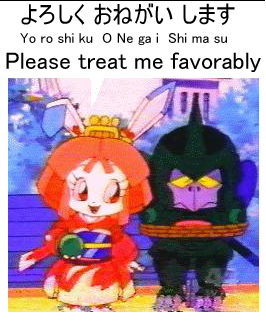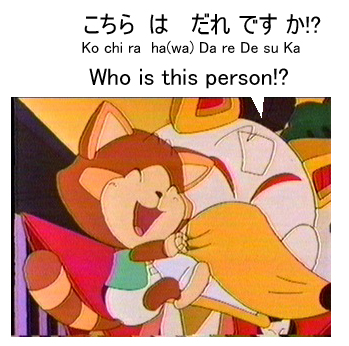Lesson 21: Yoroshiku o-negai shimas'
In this lesson, we are going to learn some useful phrases. "Yoroshiku" (yoh-roh-shee-ku) is a word that doesn't really translate very well. It's usually heard in the phrase "Yoroshiku o-negai shimas'". Most translators will translate it as "pleased to meet you", because it's often used in the same way English speaking people use that phrase. "O-negai shimas'" (Oh Neh-gai She-mahs) is a polite way to ask for something (the "O-" is there to show it's importance, like in "O-cha" (Tea) or even Lucille's Japanese name "Omitsu" (O+"Mitsu"="Honey"). "Negai" is "request", and "Shimas'" is a useful verb that basically means "do/to do/will do". You can add Shimas' to a noun to make it into action, like "Denwa (telephone) shimas'" = "Call on the telephone". You can use O-negai Shimas' to ask for stuff in a shop or restaurant, - "Piza o-negai shimas'" = "Pizza please", or when you want someone to do something for you - "Kore o o-negai shimas'" "Please take care of this". It's basically used when you are requesting something.  "Yoroshii" is a polite way to say "Good/nice". By changing the -i at the end to -ku, you make it an adverb "Yoroshiku", which makes it translate to "Well/Favorably". So Yoroshiku (Favorably) + O-negai (Request) + Shimas' (Do)" = "Your favorable consideration is requested", or "Please treat me favorably", which is a more accurate translation than "Pleased to meet you". As I said above "Yoroshiku o-negai shimas'" is often used in the same way as "Pleased to meet you" is used in english. So, you can use it when you are introduced to somebody. It can also be used in business to ask potential business partners to "Give favorable consideration" in their business. In less formal situations, you can just say "Yoroshiku" by itself as sort of an abbreviated form of the phrase, but it's usually better to be polite, especially when introductions are involved. "Dozo yoroshiku" is a bit more polite and should be acceptable for most informal occasions.
"Yoroshii" is a polite way to say "Good/nice". By changing the -i at the end to -ku, you make it an adverb "Yoroshiku", which makes it translate to "Well/Favorably". So Yoroshiku (Favorably) + O-negai (Request) + Shimas' (Do)" = "Your favorable consideration is requested", or "Please treat me favorably", which is a more accurate translation than "Pleased to meet you". As I said above "Yoroshiku o-negai shimas'" is often used in the same way as "Pleased to meet you" is used in english. So, you can use it when you are introduced to somebody. It can also be used in business to ask potential business partners to "Give favorable consideration" in their business. In less formal situations, you can just say "Yoroshiku" by itself as sort of an abbreviated form of the phrase, but it's usually better to be polite, especially when introductions are involved. "Dozo yoroshiku" is a bit more polite and should be acceptable for most informal occasions.
You've already learn "Hajimemash'te", which is used when meeting someone for the first time. It comes from the verb "hajimeru" -"to begin". Hajimemash'te is also often translated as "pleased to meet you", but it's more like "(We meet) for the first time". Introducing yourself is fairly easy. Just start with "Hajimemash'te", and you can give your name with "Des'", like "Usako des'". Try it: "Hajimemash'te, (Your Name) des'". After that, you can use "Yoroshiku o-negai shimas'" or "Dozo yoroshiku". Or you can just ask "How do you do?" with "O-genki des' ka?", which we've covered in an earlier lesson.
 What if you're with someone else? You'll need the word "Kochira" (Koh-chee-rah). It means "This person". Here's how you use it to introduce someone. Let's say I want to introduce Yattaro to someone: "Kochira wa Yattaro-san des'." "This person ("wa"-shows this is the topic) Yattaro-san (Add "-san" when using someone's name, but not for your own name) is." If you want to be introduced to someone, you can ask who they are with "Donata" (Doh-nah-tah)="Who" (Polite), or "Dare" (Dah-reh)="Who" (informal). If you've been reading these lessons, you probably already know how to make "Donata" or "Dare" into a question: "Donata des' ka?". That's good enough if it's already understood who you are talking about. If you need to be more specific, you can add "Kochira wa" like so "Kochira wa dare des' ka?" = "This person who is?" or "Who is this?" The difference in levels of politeness between using Donata and Dare is sort of like the difference between asking "May I ask who this is?" and "Who's this?"
What if you're with someone else? You'll need the word "Kochira" (Koh-chee-rah). It means "This person". Here's how you use it to introduce someone. Let's say I want to introduce Yattaro to someone: "Kochira wa Yattaro-san des'." "This person ("wa"-shows this is the topic) Yattaro-san (Add "-san" when using someone's name, but not for your own name) is." If you want to be introduced to someone, you can ask who they are with "Donata" (Doh-nah-tah)="Who" (Polite), or "Dare" (Dah-reh)="Who" (informal). If you've been reading these lessons, you probably already know how to make "Donata" or "Dare" into a question: "Donata des' ka?". That's good enough if it's already understood who you are talking about. If you need to be more specific, you can add "Kochira wa" like so "Kochira wa dare des' ka?" = "This person who is?" or "Who is this?" The difference in levels of politeness between using Donata and Dare is sort of like the difference between asking "May I ask who this is?" and "Who's this?"
Lets practice:
Usako meets Omitsu and Yattaro
Usako: "Hajimemash'te! Usako des'. Yoroshiku o-negai shimas'."
Omitsu: "Hajimemash'te! Omitsu des'. Dozo yoroshiku!"
Usako: "Donata des' ka?"
Omitsu: "Kochira wa Yattaro-san des'."
Yattaro: "Yoroshiku."
 "Yoroshii" is a polite way to say "Good/nice". By changing the -i at the end to -ku, you make it an adverb "Yoroshiku", which makes it translate to "Well/Favorably". So Yoroshiku (Favorably) + O-negai (Request) + Shimas' (Do)" = "Your favorable consideration is requested", or "Please treat me favorably", which is a more accurate translation than "Pleased to meet you". As I said above "Yoroshiku o-negai shimas'" is often used in the same way as "Pleased to meet you" is used in english. So, you can use it when you are introduced to somebody. It can also be used in business to ask potential business partners to "Give favorable consideration" in their business. In less formal situations, you can just say "Yoroshiku" by itself as sort of an abbreviated form of the phrase, but it's usually better to be polite, especially when introductions are involved. "Dozo yoroshiku" is a bit more polite and should be acceptable for most informal occasions.
"Yoroshii" is a polite way to say "Good/nice". By changing the -i at the end to -ku, you make it an adverb "Yoroshiku", which makes it translate to "Well/Favorably". So Yoroshiku (Favorably) + O-negai (Request) + Shimas' (Do)" = "Your favorable consideration is requested", or "Please treat me favorably", which is a more accurate translation than "Pleased to meet you". As I said above "Yoroshiku o-negai shimas'" is often used in the same way as "Pleased to meet you" is used in english. So, you can use it when you are introduced to somebody. It can also be used in business to ask potential business partners to "Give favorable consideration" in their business. In less formal situations, you can just say "Yoroshiku" by itself as sort of an abbreviated form of the phrase, but it's usually better to be polite, especially when introductions are involved. "Dozo yoroshiku" is a bit more polite and should be acceptable for most informal occasions.
 What if you're with someone else? You'll need the word "Kochira" (Koh-chee-rah). It means "This person". Here's how you use it to introduce someone. Let's say I want to introduce Yattaro to someone: "Kochira wa Yattaro-san des'." "This person ("wa"-shows this is the topic) Yattaro-san (Add "-san" when using someone's name, but not for your own name) is." If you want to be introduced to someone, you can ask who they are with "Donata" (Doh-nah-tah)="Who" (Polite), or "Dare" (Dah-reh)="Who" (informal). If you've been reading these lessons, you probably already know how to make "Donata" or "Dare" into a question: "Donata des' ka?". That's good enough if it's already understood who you are talking about. If you need to be more specific, you can add "Kochira wa" like so "Kochira wa dare des' ka?" = "This person who is?" or "Who is this?" The difference in levels of politeness between using Donata and Dare is sort of like the difference between asking "May I ask who this is?" and "Who's this?"
What if you're with someone else? You'll need the word "Kochira" (Koh-chee-rah). It means "This person". Here's how you use it to introduce someone. Let's say I want to introduce Yattaro to someone: "Kochira wa Yattaro-san des'." "This person ("wa"-shows this is the topic) Yattaro-san (Add "-san" when using someone's name, but not for your own name) is." If you want to be introduced to someone, you can ask who they are with "Donata" (Doh-nah-tah)="Who" (Polite), or "Dare" (Dah-reh)="Who" (informal). If you've been reading these lessons, you probably already know how to make "Donata" or "Dare" into a question: "Donata des' ka?". That's good enough if it's already understood who you are talking about. If you need to be more specific, you can add "Kochira wa" like so "Kochira wa dare des' ka?" = "This person who is?" or "Who is this?" The difference in levels of politeness between using Donata and Dare is sort of like the difference between asking "May I ask who this is?" and "Who's this?"